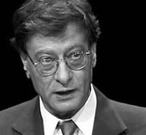Biography

On March 13, 1941 Mahmoud Darwish was born in Al Birweh, Palestine, into a land-owning Sunni Muslim family. During the establishment of the State of Israel in 1948, his village was destroyed and his family fled to Lebanon. They returned the following year, secretly re-entering Israel.
As a young man, Darwish faced house arrest and imprisonment for his political activism and for publicly reading his poetry. He joined the official Communist Party of Israel, the Rakah, in the 1960s. In 1970, he left for Russia, where he attended the University of Moscow for one year, and then moved to Cairo. He lived in exile for twenty-six years, between Beirut and Paris, until his return to Israel in 1996, after which he settled in Ramallah in the West Bank.
Considered Palestine's most eminent poet, Darwish published his first collection of poems, Leaves of Olives, in 1964, when he was 22. Since then, Darwish has published approximately thirty poetry and prose collections which have been translated into more than twenty-two languages.
Some of his more recent poetry titles include The Butterfly's Burden (Copper Canyon Press, 2006), Unfortunately, It Was Paradise: Selected Poems (2003), Stage of Siege (2002), The Adam of Two Edens (2001), Mural (2000), Bed of the Stranger (1999), Psalms (1995), Why Did You Leave the Horse Alone? (1994), and The Music of Human Flesh (1980).
Darwish was an editor for a Palestine Liberation Organization monthly journal and the director of the group's research center. In 1987 he was appointed to the PLO executive committee, and resigned in 1993 in opposition to the Oslo Agreement. He served as the editor-in-chief and founder of the literary review Al-Karmel, published out of the Sakakini Centre since 1997
About Darwish's work, the poet Naomi Shihab Nye has said, "Mahmoud Darwish is the Essential Breath of the Palestinian people, the eloquent witness of exile and belonging, exquisitely tuned singer of images that invoke, link, and shine a brilliant light into the world's whole heart. What he speaks has been embraced by readers around the world—his in an utterly necessary voice, unforgettable once discovered."
His awards and honors include the Ibn Sina Prize, the Lenin Peace Prize, the 1969 Lotus prize from the Union of Afro-Asian Writers, France's Knight of Arts and Belles Lettres medal in 1997, the 2001 Prize for Cultural Freedom from the Lannan Foundation, the Moroccan Wissam of intellectual merit handed to him by King Mohammad VI of Morocco, and the USSR's Stalin Peace Prize.
Darwish died on August 9, 2008, in Houston, TX, after complications from heart surgery.
* Asafir bila ajniha (Wingless birds), 1960
* Awraq Al-Zaytun (Leaves of olives), 1964
* Ashiq min filastin (A lover from Palestine), 1966
* Akhir al-layl (The end of the night), 1967
* Yawmiyyat jurh filastini (Diary of a Palestinian wound), 1969
* Habibati tanhad min nawmiha (My beloved awakens), 1969
* al-Kitabah 'ala dhaw'e al-bonduqiyah (Writing in the light of the gun), 1970
* al-'Asafir tamut fi al-jalil (Birds are Dying in Galilee), 1970
* Mahmoud Darwish works, 1971. Two volumes
* Mattar na'em fi kharif ba'eed (Light rain in a distant autumn) 1971
* Uhibbuki aw la uhibbuki (I love you, I love you not), 1972
* Jondiyyun yahlum bi-al-zanabiq al-baidaa' (A soldier dreaming of white lilies), 1973
* Complete Works, 1973. Now al-A'amal al-jadida (2004) and al-A'amal al-oula (2005).
* Muhawalah raqm 7 (Attempt number 7), 1974
* Tilka suratuha wa-hadha intihar al-ashiq (That's her image, and that's the suicide of her lover), 1975
* Ahmad al-za'tar, 1976
* A'ras (Weddings), 1977
* al-Nasheed al-jasadi (The bodily anthem), 1980. Joint work
* The Music of Human Flesh, Heinemann 1980, Poems of the Palestinian struggle selected and translated by Denys Johnson-Davies
* Qasidat Bayrut (Ode to Beirut), 1982
* Madih al-zill al-'ali (A eulogy for the tall shadow), 1983
* Hissar li-mada'eh al-bahr, 1984
* Victims of a Map, 1984. Joint work with Samih al-Qasim and Adonis in English.
* Sand and Other Poems, 1986
* Hiya ughniyah, hiya ughniyah (It's a song, it's a song), 1985
* Ward aqal (Fewer roses), 1985
* Ma'asat al-narjis, malhat al-fidda (Tragedy of daffodils, comedy of silver), 1989
* Ara ma oreed (I see what I want), 1990
* Ahad 'asher kaukaban (Eleven planets), 1992
* Limaza tarakt al-hissan wahidan (Why Did You Leave the Horse Alone?), 1995. English translation 2006 by Jeffrey Sacks (Archipelago Books) (ISBN 0-9763950-1-0)
* Psalms, 1995. A selection from Uhibbuki aw la uhibbuki, translation by Ben Bennani
* Sareer El-Ghariba (Bed of a stranger), 1998
* Then Palestine, 1999 (with Larry Towell, photographer, and Rene Backmann)
* Jidariyya (Mural), 2000
* The Adam of Two Edens: Selected Poems, 2000 (Syracuse University Press and Jusoor) (edited by Munir Akash and Carolyn Forche)
* Halat Hissar (State of siege), 2002
* La ta'tazer 'amma fa'alt (Don't apologize for what you did), 2003
* Unfortunately, It Was Paradise: Selected Poems, 2003. Translations by Munir Akash, Caroyln Forché and others
* al-A'amal al-jadida (The new works), 2004. A selection of Darwish's recent works
* al-A'amal al-oula (The early works), 2005. Three volumes, a selection of Darwish's early works
* Ka-zahr el-lawz aw ab'ad (Same as almond flowers or farther), 2005
* The Butterfly's Burden, 2007 (Copper Canyon Press) (translation by Fady Joudah)
Last updated August 30, 2011



